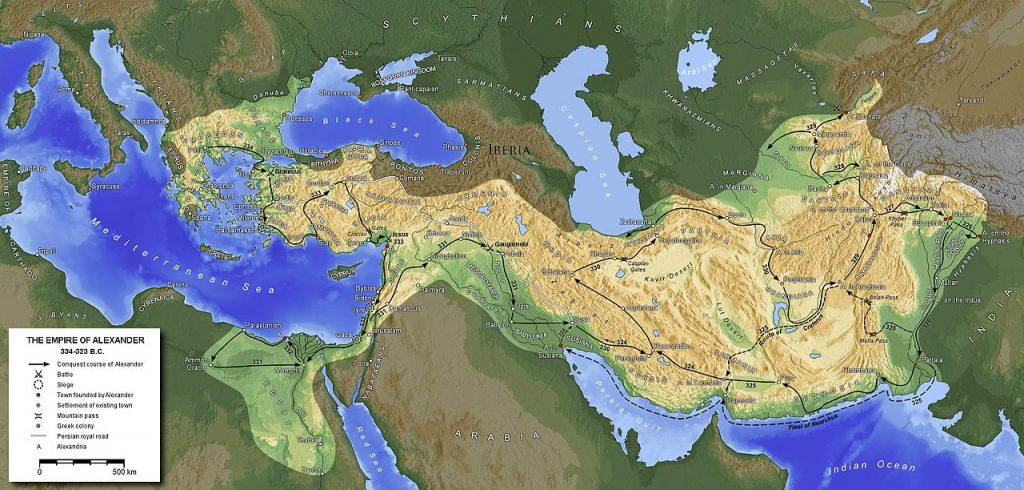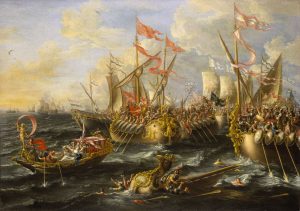In recorded history, countless individuals held the titles of king, and sought to rule and conquer to achieve greatness and prestige. The Kingdom of Macedonia produced two such individuals. These great kings demonstrated awesome military and diplomatic ability that allowed their actions to have profoundly impacted human civilization.1 One king is known to history as arguably one of the greatest conquers of the ancient world, Alexander the Great. The other king was his father, Philip II of Macedonia.2 The rule of Philip II saw the rise of Macedonia from a weak state unto a powerful and influential state that would come to dominate the Greek peninsula. Philip was able to transform his state by reorganizing the military and beginning successful military campaigns.3 A young Alexander had been groomed to one day take reigns Macedonia and he was able to take the legacy created by his father and built upon it. Alexanders military exploits ultimately immortalized himself in history as a legendary figure of great significance.

Philip II rose to the Macedonian throne in 359 BCE. He was twenty-four years of age. Due to the unstable and weak position of Macedonia in his youth, Philip lived as a political hostage in Thebes, where he would learn military strategy and different customs. As a child Philip demonstrated great ability to learn and understand, often said to have been a genius. At the beginning of his reign Macedonia was not a powerful state by any means. It was a divided nation between Upper Macedonia and Lower Macedonia that was governed by sets of powerful families with great influence.4 It possessed a relatively weak and poorly trained army, who mostly fought to survive against invading foreign powers. Macedonia was weak economically and institutionally, and surrounded by more powerful neighbors. It was bordered by the Illyrians to the north, Thrace to the east, and Epirus to the west who often preyed upon the weak nation through invasions and occupation.5
Philip II demonstrated great prowess in military, political, and diplomatic affairs. One of the first actions he took as King was to reorganize the military by increasing the size and therefore power of the Macedonian military, creating the famous Macedonian phalanx and a professional infantry core unit. Phillip demonstrated his diplomatic skill by using the act of marriage to secure numerous alliances, often taking foreign wives.6 Philip, through strategic planning and maneuvering, was able to use his new army to make Macedonia the hegemonic power in Greece through conquest. Upon Philip’s death, Macedonia had conquered Greece and set itself on a trajectory of conquest over much of Asia.7
Alexander was born in July 356 BCE, and was groomed to take the throne. It was said that Alexander was taught physical education by Leonidas and intellectually by Lysimachus of Acarnania, and by Aristotle. He was taught and given Aristotle’s edition of Homer’s works, which he kept as his most valuable possession. He grew to believe in Homeric notion of honor and glory as measurements of personal worth, trying to emulate his heroes Heracles and Achilles. The young Alexander proved to be a great student and demonstrated scholarly skill and interests. His studies came to an end at the age of sixteen, when he was named regent in his father’s absence. Alexander quickly began to showcase his talents as he was able end a revolt. His first military campaign being a success, his father eventually gave him command of the left flank of the Macedonian army, where Alexander continued to achieve military and diplomatic successes.8

Alexander ascended to the Macedonian throne upon the death of his father Philip, who was assassinated before he could launch his campaign to conquer Persia. The young Alexander was twenty-years old. Alexander took reins of his father’s work and set out to achieve success. He fulfilled Philip’s ambitious goal of conquering Asia Minor. In the autumn of 333, Alexander crushed King Darius III of Persia. Alexander had conquered the famed Persian Empire and expanded his empire. With the support of his loyal army, Alexander planned on conquering India, which was only ended by the refusal of his Macedonian troops to continue. Alexander the Great died in Babylon in 323 after falling ill at the age of thirty-three, having never lost a military battle. His legacy, however, continues to influence human history to present day. He is credited with spreading Hellenic culture throughout the areas he conquered.9
- Salem Press Biographical Encyclopedia, 2017, s.v., “Alexander the Great,” by Clark G. Reynolds. ↵
- Edmund M. Burke, “Philip II and Alexander the Great,” Military Affairs vol. 47, no. 2 (1988): 67-70. ↵
- Edward M. Anson, Alexander the Great: Themes and Issues (London: Bloomsbury Pub, 2013., 2013), 43-44. ↵
- Ian Worthington, Alexander the Great : Man and God (Routledge, 2014), 15. ↵
- G. T. Griffith, “The Macedonian Background,” Greece & Rome, vol. 12, no. 2 (1965): 125–26. ↵
- Edward M. Anson, Alexander the Great: Themes and Issues (London: Bloomsbury Pub, 2013), 54. ↵
- Ian Worthington, Alexander the Great : Man and God (Routledge, 2014), 25. ↵
- Ian Worthington, Alexander the Great : Man and God (Routledge, 2014), 36-37. ↵
- Salem Press Biographical Encyclopedia, 2017, s.v., “Alexander the Great,” by Clark G. Reynolds. ↵



42 comments
Thomas Fraire
Alexander carried on his Fathers inheritance, Philip II, by being an extraordinary military and legislator. A characteristic conceived pioneer, he emulated his dad’s example. Alexander was successful in his battle to vanquish Aisa Minor, and his desire was considerably more noteworthy than his fathers with dreams of growing his domain to India. He carried on with a short life as indicated by the present standard, however, his military ability and achievements remain very amazing.
Michael Thomas
I found this article interesting because of how it details the rule of the Macedonians and the expansion of their empire. I learned about Alexander the Great in high school. He was a great leader and he was tutored by the well known Greek philosopher Aristotle. Throughout Alexander’s time as king, Macedonia prospered and gained more territory through his military leadership skills.
Maricela Guerra
Never once did I hear about the story of Alexander the Great, his name is famous. Now knowing what he was actually famous and all that great about makes more sense. I would see why they people in greek would give him such a name. He was like the whole package of the perfect guy, smart, strong, showed dedication, and did everything that a great could do.
Natalia Carroll-Long
I’ve learned about the conquests of Alexander the Great, but never about his father Philip ii. I think by adding the story of Philip, it really shows how Alexander was perfect for the conquest of Macedonia. I never knew that he was in fact finishing the work of his father who also was a natural leader. This article really explains how these two were able to become great conquerors.
Seth Castillo
Alexander the great and King Philip II were amazing tacticians. Alexander never lost a battle and Phillip was able to create such a strong military force. The two of them together could have resulted in a domination of more than just Asia. These two men knew when and where they needed to be to not only destroy the enemy but to lose the least amount of men. King Philip had the tactical advantage of gaining allies with many kingdoms. The two had different methods but both got amazing things done.
Carlos Vazquez
The first time I heard of the Macedonians was during history class in high school, when I learned about alexander the greats conquests and influence. I had never heard about his father Philip, who’s success ultimately allowed Alexander to archive everything he did. This article was well written and it allowed me to see how Alexander and his father were able to become the great emperors they have become known for.
Edgar Ramon
The conquests of Alexander leave you wondering what could have happened, how would the world be different, had Alexander reached further into Asia. And yes he unfortunately died of dysentery, an illness that today is virtually non-existent, or easily curable. It is hard to imagine, how Alexander and his army were able to maintain a healthy number of warriors while maintaining the conquered lands. He was truly one of those legendary, heroic figures in World history that you just can not ignore.
Kimberly Simmons
I’ve never read anything about King Philp II or Alexander the Great that wasn’t from a text book. It’s interesting to read of how successful Philip was during his reign – especially at his building of Macedonia. Alexander, like his father, was a young ruler with great plans. Both of these men are historical figures that remain legends to this day.
Hector Garcia
I have heard enough stories of Alexander the Great during his military campaign and I have to say that I rarely read about his father, King Philip II. It is interesting how a political prisoner would one day be king of Macedonia. It is incredible how King Philip II made Macedonia the empire that we read about today, and it is fascinating to read that this man impacted human civilization.
Julian Aguero
Its pretty interesting to see where Alexander’s traits of being a great warrior and leader stem from. If Philip II wasn’t as ambitious and successful during his time as king then we can only imagine what type of leader Alexander would have been. I knew the might and wisdom had to be instilled in him at a very young age to become a great leader but I did not know it came from his father’s influence of being a great king. It’s astonishing to think that Alexander could be so influential through out the world and die so young.